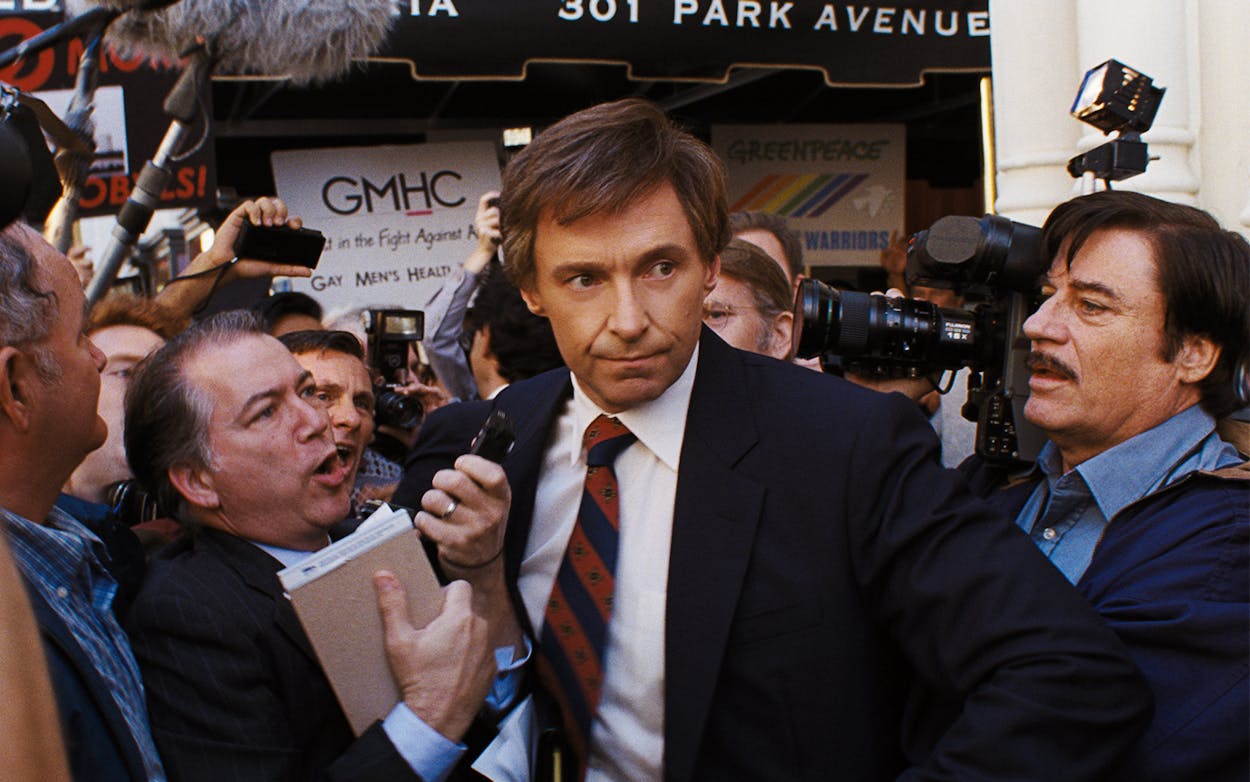When he introduced The Front Runner on closing night at the Austin Film Festival, director Jason Reitman polled the audience: How many people at the Paramount Theater were familiar with the Gary Hart scandal that the movie is about? Most of the hands in the room stayed down. Reitman, a veteran of the film festival (one of his early short films premiered there), explained that when he learned the full story from a Radiolab podcast a few years ago, he realized that much of our current political situation could be explained by what happened over a few weeks in 1987, when three reporters confronted the likely Democratic candidate for president in an alley outside his home and no one knew exactly what to do.
But The Front Runner doesn’t do much to provide answers to the questions it raises. Instead, the film offers a panorama of a moment, featuring more than a dozen characters whose viewpoints get represented.
For those who’d have kept their hands down in the audience, Hart’s story culminated in 1987, as the former Colorado senator ran for the Democratic Party’s presidential nomination in the 1988 election. Hart (played by Hugh Jackman) was a youthful, swaggering candidate who suggested something inspirational in progressive politics—more a Barack Obama or a Beto O’Rourke than a Clinton—and the political press corps admired him as an outdoorsy candidate who declined double-speak. There had been rumors about his marital fidelity—at one point, Hart and his wife, Lee (played in The Front Runner by Vera Farmiga), had been separated—and when pressed about it by the New York Times, Hart challenged the media to find anything salacious in his past. A trio of reporters from the Miami Herald, acting on an anonymous tip, did just that, following a young woman named Donna Rice from Florida to Hart’s house in D.C. and confronting the candidate in an alley to ask him if he was having an affair.
Both Hart and Rice deny to this day that their relationship was sexual, but the damage was done nonetheless. Hart quickly became a national punchline for meeting the younger woman on a boat called “Monkey Business,” and as pressure mounted on him and his family, he ended his candidacy shortly after the Herald‘s story broke.
Reitman uses Hart’s story to raise complicated questions with often contradictory answers. Are politics less civil because people who seek public office can expect the details of their private lives to be dissected in the 24-hour news cycle? When the press maintained “gentlemen’s agreements,” not holding powerful men accountable about their sexual dalliances, did they abdicate a responsibility to inform the public, or keep their focus on the things that actually mattered? One question leads to another, and none of the answers are conclusive. More than focusing on a campaign or a scandal, The Front Runner is about how unsatisfying it is to be rudderless in changing times.
In the film, Reitman uses his characters to explore competing answers to these difficult questions. J.K. Simmons plays Bill Dixon, Hart’s strategist who accepts the changing nature of politics even as he laments it. Alfred Molina plays Ben Bradlee, the Post editor who acknowledges covering for L.B.J. and J.F.K. when they had their affairs. Sara Paxton, as Rice, brings pain and humanity to a person who, in the media, was treated as little more than a blonde sitting on an important man’s lap. Ari Graynor, as Post reporter Ann Devroy, questions why the way powerful men view the women around them should be off-limits. Molly Ephraim, playing a composite character who works for the Hart campaign, struggles with watching a boss she believes in allow a young woman to suffer the scorn of a nation. King of the Hill creator Mike Judge plays Herald editor James Savage, who attempts to serve as a backstop against publishing what he considers sloppy reporting. Each scene in the film containing multiple viewpoints even as the story spins out of control around them.
It’s a lot to take in, but it definitely speaks to something that’s difficult to get across about politics and the pace at which our norms in politics change. The film receives its initial release on Tuesday—Election Day—in a handful of theaters, before broader distribution later in November. At that point, the political moment will look different than it did when The Front Runner was screened (and when it was filmed—Reitman, in the post-screening Q&A, noted that they were in the middle of shooting when the #MeToo movement began). That makes The Front Runner a complicated film, and an essential one—history doesn’t change, but our perspective on it does, and the film itself notes how quickly that happens.
During a Q&A after the screening, Reitman talked, among other things, about showing the movie to many of its real-life subjects. He talked about how Hart seemed to like it and how Rice cried, as Paxton’s performance allowed her to feel the sadness she hadn’t allowed herself to experience at the time. At one point, someone in the audience asked what happened to Dixon, the character played by J.K. Simmons. Reitman began to answer, and another voice from the audience shouted, “He’s in Madison.” It was Dixon’s daughter, who attended the screening unbeknownst to the director. Reitman asked if her father ever worked in politics again after that, and she explained that he did not, instead ending his career as a civil rights lawyer in Wisconsin. “The Hart campaign broke his heart,” she said. It was a reminder that even as the questions that the film raises feel like hypothetical explorations, the impact of the events are all too personal for those who lived them.








